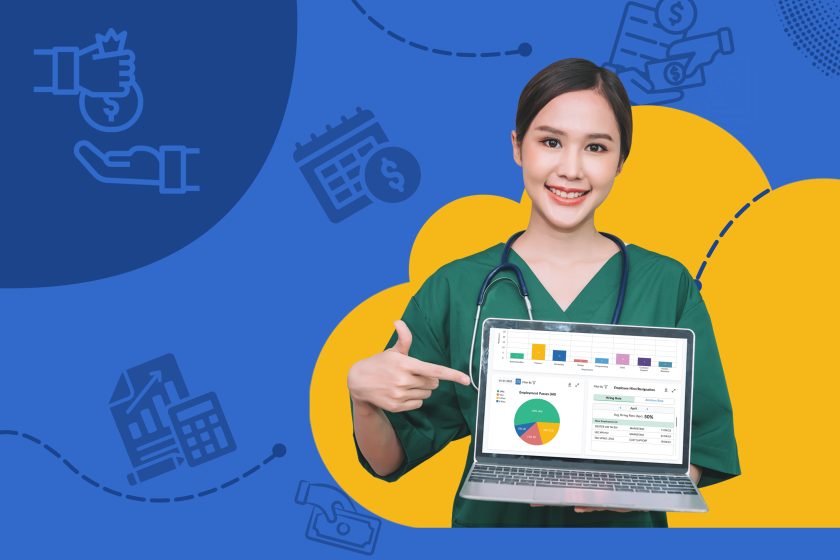Healthcare organizations working together with medical practices experience numerous benefits through the implementation of payroll software systems. The complex management demands of operating a healthcare or medical practice extend beyond patient care. This is because practitioners must supervise diverse networks of doctors, nurses, and all levels of administrative professionals.
These situations turn payroll management into an exceptionally daunting task which remains a constant source of frustration for numerous individuals. Many healthcare organizations still rely on old-fashioned manual payroll processes together with spreadsheet systems. It leads to payroll errors and compliance risks while demanding excessive administrative effort.
Learn More: Common Payroll Compliance Pitfalls Malaysian Businesses Face
At this crucial moment, the deployment of payroll software systems can impact with a huge difference. Payroll management involves more than basic employee payment tasks. It is a complex automated system that ensures payroll processing happens both timely and accurately while also adhering to regulatory standards. This allows your staff to focus on critical patient care activities. Let’s dive into the blog to gain a brief understanding of the important role of payroll software for the healthcare industry.
Payroll in Healthcare: Beyond Making Salary Payments
Managing payroll procedures within the healthcare sector is quiet more complex than in other business industries. The management of payroll systems demands diverse pay structures with shift-based compensation while adhering to compliance standards. This will be in contrast to traditional office environments where employees maintain fixed working hours and receive standard salaries.
The medical field functions as a complex ecosystem. It has various worker is categorized such as permanent staff members, part-time employees, temporary employees and contract nurses. Though all perform their duties together, yet each group receives its own unique set of pay rates and benefits packages. The incorporation of this unique modification into payroll systems creates many complexities that make payroll calculations more difficult.
Healthcare field professionals perform shift work that encompasses night duties together with weekend hours and emergency on-call periods. Calculating these differentials manually requires a significant amount of time to complete. There are also chances that they might be prone to payment errors and cause employee dissatisfaction. Payroll software is programmed to eliminate all these risks by automating every process. As the system is set with predefined formulas and compliance rules, there will be a significant difference compared to the traditional process.
Saving Time for HR and Administrative Teams
The dedicated HR groups are already assigned with responsibilities to perform from recruitment activities to managing employee benefits. When payroll processing becomes part of their roles, their responsibilities expand and increase their workload. This creates extra burdens that lead to inefficiencies and potential mistakes. The complex procedure of manual payroll management demands HRs to perform extensive tasks that eventually consume plenty of time.
Through the implementation of payroll software systems businesses gain the capability to handle salary payments and direct deposits together. This comes along with tax filings by utilizing automation features that perform these tasks without requiring manual intervention. After the initial setup phase, payroll processing evolves into a simple task that demands only a few clicks to perform the actions. This enables HR teams to direct their efforts toward strategic objectives and developing workforce advancement plans. Organizations that implement automated systems to handle administrative tasks experience enhanced operational efficiency and productivity.
Enhancing Payroll Security with Cloud-Based Systems
Performing payroll processes with traditional manual techniques or simple spreadsheet applications creates security risk. Payroll data encompasses numerous sensitive elements including employee salaries tax details and bank account numbers. If this data is managed improperly, it generates various opportunities for security breaches with incidents of unauthorized access.
Cloud-based payroll software systems enhance their security features by deploying data encryption techniques. This comes together with user role-based access restrictions which makes them more robust. The framework of access controls permits the assignment of unique access permissions. This management ensures sensitive payroll data remains exclusively within authorized hands.
This automated backup system ensures the maintenance of payroll records by safeguarding them against loss during system malfunctions and cyberattacks. By making the switch to payroll software systems, healthcare organizations can manage to protect employee data while ensuring compliance with data privacy regulations.
Improving Employee Satisfaction with Self-Service Access
The operation of payroll systems encounters several challenges with managing a continuous stream of employee questions that demand access to payslips as well as tax documents, leave balances and payment details. Traditionally, human resource departments manage these requests through manual processes.
Payroll software resolves this by providing the employees with self-service portals. It permits employees to access their payroll information systems while enabling payslips downloads and check tax deductions alongside tracking leave balances without HR assistance. It achieves dual objectives by simultaneously boosting transparency and elevating employee satisfaction by providing direct access to payroll information. This has a reflex action on gaining the employees trust and satisfaction within the organization.
Conclusion
Healthcare organizations have begun to recognize payroll software as an essential investment due to its capacity to enhance operational efficiency while maintaining precision in payroll management. Automation systems when implemented ensure precise payroll calculations while minimizing compliance risks which enables HR teams to redirect their efforts from routine tasks to strategic initiatives.
For healthcare industries who are still holding on to traditional methods of payroll systems, shifting to modern payroll solution is essential.
Read More: 5 Common Problems You Find In Traditional Payroll Processes
This transition ensures that employees receive the right pay at the right time, allowing your organization to maintain excellence in patient care without administrative burdens. Now is the time to move forward with a smarter payroll solution that enhances efficiency, ensures compliance, and supports a more motivated workforce—so you can focus on what truly matters: delivering exceptional healthcare.
